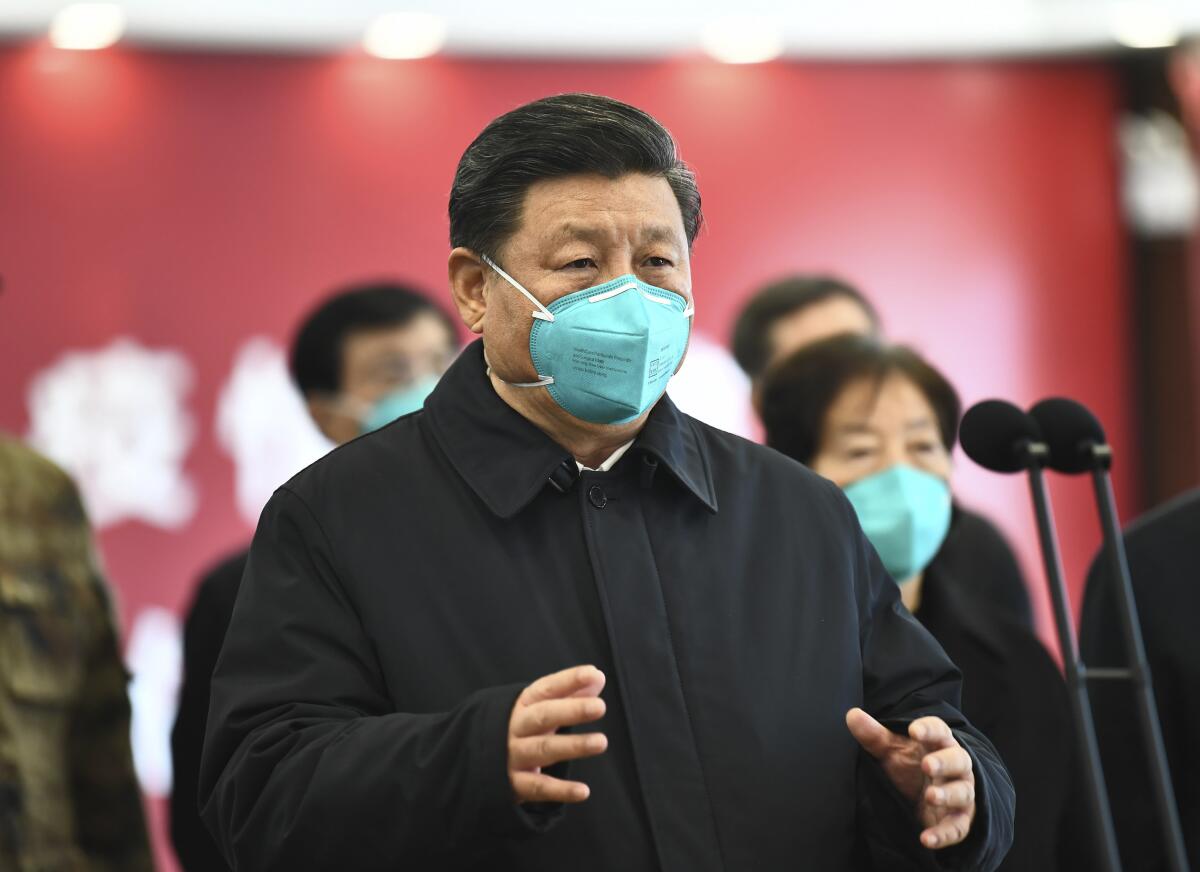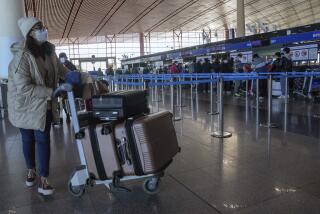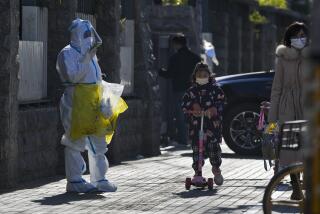Column: China rises as Trump cedes leadership in coronavirus crisis

- Share via
WASHINGTON — In the best of all pandemic-ridden worlds, the coronavirus would spur powerful countries to cooperate with one another since everyone is facing the same danger.
Not this time. The United States and China have turned the pandemic into a battle zone in their struggle for global influence.
And so far, the United States is losing ground.
After bungling its initial response to the infections that first appeared in Wuhan, China appears to have largely contained the contagion and is delivering medical supplies to Italy, Spain and other hard-hit countries. Chinese President Xi Jinping spent last week on the phone offering well-publicized help to leaders around the world.
The White House bungled the U.S. response by failing to stockpile test kits and medical supplies, insisting that a travel ban with China would protect Americans. It didn’t. After initially sending aid to Italy, federal officials are now frantically trying to buy masks and other critically needed gear from other countries to cover shortages at home.
Meanwhile, Beijing and Washington squabbled over which country was to blame.
In China, officials initially tried to cover up the Wuhan outbreak and rebuffed U.S. and United Nations offers to send scientists to help study the virus. The Chinese Foreign Ministry spread a conspiracy theory, unsupported by evidence, that visiting U.S. soldiers had introduced it.
Secretary of State Michael R. Pompeo called his counterpart in Beijing to complain, and launched a broad attack on Xi’s government.
“The Chinese Communist Party poses a substantial threat to our health and way of life, as the Wuhan virus clearly has demonstrated,” Pompeo told reporters, blasting Beijing for providing assistance to other countries and then “claiming that they are now the white hat.”
Pompeo also created a needless diplomatic flap last week by demanding that the Group of 7 democracies blame the pandemic on the “Wuhan virus” in a joint communique intended to show global powers standing shoulder to shoulder during a global crisis.
The other G-7 countries refused and the joint statement was shelved. As a result, a once-powerful coalition led by the United States was visibly disunited.
Trump chairs the G-7 this year, but diplomats said he didn’t convene a videoconference of its leaders until France’s Emmanuel Macron repeatedly nudged him to.
That’s not leadership.
Pompeo is right about the facts. China did try to cover up the initial outbreak. Its Communist Party does lead a brutally authoritarian regime.
But he is ignoring our allies’ needs. European countries in the grips of the deadly pandemic want China’s help. They don’t want to score rhetorical points against Beijing; they need to stay on Xi’s good side.
China’s apparent recovery, coupled with the White House disarray, has given Xi an opportunity to win hearts and minds around the world. When people are sick, they don’t care where the medicine comes from. Xi is simply doing what any normal big-power leader would do: working to expand his country’s influence.
The problem isn’t that China is acting more like a global leader. It’s that the United States is acting less like one.
The State Department offered aid to more than two dozen countries, but it’s been virtually invisible, both because he’s preoccupied with the pandemic at home and because he shows such disdain for alliances and international organizations.
China’s still recovering from its outbreak. Although its economy is the world’s second-largest, its military is far smaller than America’s. It has fewer allies. It limits access to the internet, jails dissidents and recently expelled journalists from major U.S. news organizations.
And Beijing’s aid offensive hasn’t been error-free. There has been a backlash in parts of Europe against clumsy Chinese efforts to mix humanitarian aid with commercial deals, like the electronic giant Huawei’s shipments of surgical masks to countries where it’s seeking big contracts.
“I’d say both the U.S. and China are playing the soft-power game very poorly,” Susan A. Thornton, a former State Department China expert, told me.
“Trying to use a disaster response to score political points is tricky,” she said. “When thousands of people are dying, you’d better be seen to be doing everything you can to save lives and cooperate, or you’re not going to win any hearts and minds.”
If the question is which political or economic model has been most effective in fighting the pandemic, the answer is neither China nor the United States. The places that have fared best so far are well-run democracies with sophisticated healthcare networks that did lots of early testing: South Korea, Taiwan, possibly Germany.
Like any other global cataclysm, the pandemic appears likely to change the balance of power — depending partly on which countries recover quickly.
So far, China appears to have increased its influence; how much isn’t clear. It has made the United States look ineffective; how durably isn’t clear.
It has made traditional institutions of international cooperation, like the U.N. and the G-7, look irrelevant as a medical catastrophe and economic carnage pose dangers to global stability.
That makes the most likely outcome a world in which nobody’s a winner.
More to Read
Get the L.A. Times Politics newsletter
Deeply reported insights into legislation, politics and policy from Sacramento, Washington and beyond. In your inbox twice per week.
You may occasionally receive promotional content from the Los Angeles Times.











